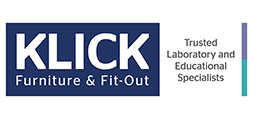13 Nov Laboratory Furniture – Tips for Selecting the Best Materials
Laboratories are specialised spaces where research, testing and analysis are conducted daily. These critical environments require laboratory furniture that is not only durable but also acts as the foundation of an efficient workspace.
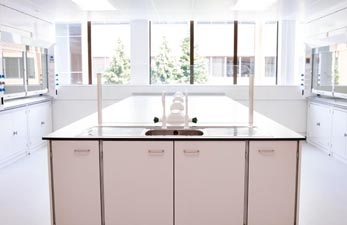
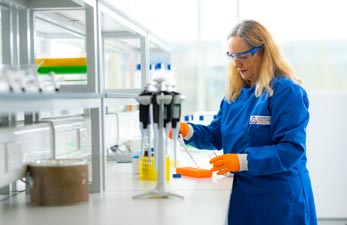
Selecting the right materials for laboratory furniture can prevent wear, reduce contamination risks and lower long-term maintenance costs, making it an important consideration for facilities managers, lab technicians and business owners.
Here, we’ll look at key factors for choosing laboratory furniture materials, along with recommendations on specific material types that balance durability and functionality.
Choosing the Best Materials for Laboratory Environments
Laboratory furniture, including worktops, cabinets and storage units, must be crafted from high-quality, durable materials capable of withstanding regular exposure to chemicals, heat, moisture and constant use. Choosing suitable materials protects against damage, minimises replacement costs and helps maintain a clean, safe environment for staff.
High-quality furniture supports precise experimental outcomes, as the risk of contamination is lowered with furniture that is easy to clean and resistant to chemical spills. With the right materials, labs can operate smoothly and safely for years without the frequent interruptions of repairs or replacements.
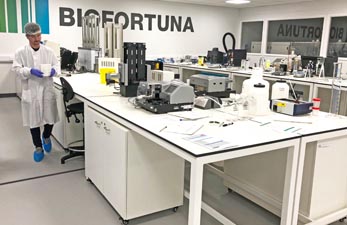
Selecting Laboratory Furniture Materials – Key Factors
When selecting materials for laboratory furniture, consider these essential factors:
Durability
Laboratory furniture must handle rigorous daily use, including frequent cleaning, heavy equipment loads and varying temperatures.
Resistance to Chemicals
Lab furniture must withstand the chemicals, solvents and acids frequently used in experiments. Materials should not degrade upon contact with these substances, ensuring durability and maintaining a safe environment.
Ease of Cleaning
Cleanable surfaces reduce contamination risks and facilitate accurate test results, critical in environments where sterility is essential.
The Best Worktop Materials for Laboratory Furniture
Different worktop materials suit specific laboratory needs. Here are three widely used materials with distinct advantages:
1. Trespa Worktops
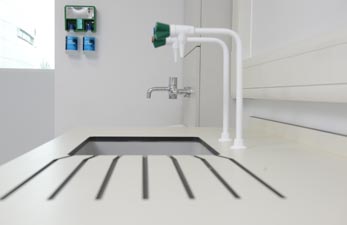
Trespa is a high-pressure laminate (HPL) that combines strength with versatility and is ideal for most laboratory settings. Klick offers two main types of Trespa worktops:
Trespa TopLab BASE
This durable material offers excellent scratch and wear resistance, making it suitable for high-traffic general-purpose labs and educational environments. Trespa is easy to clean and safe for food contact.
Trespa TopLab PLUS ALIGN
Known for its resistance to aggressive chemicals, this option is highly suitable for labs handling corrosive substances. Its bio-based carbon content (85%) makes it an environmentally friendly choice, supporting renewable material use. Additionally, its non-porous surface does not support bacterial growth, making it ideal for sterile environments.
2. Velstone Worktops
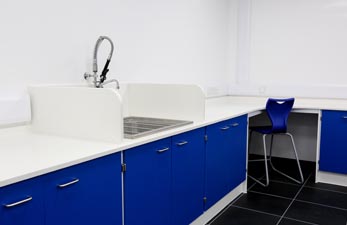
Velstone is a solid 25mm surface material which is non-porous and highly resistant to bacterial growth. It offers a smooth, seamless aesthetic and is easy to maintain, as scratches and stains can be removed on-site. These properties make Velstone an attractive option for laboratories where sterility and visual appeal are priorities.
3.Epoxy Resin worktops
Epoxy Resin is cast in solid homogeneous form. It is durable, chemical and stain resistant, robust and easy to clean. Worktops cannot delaminate and have the same excellent chemical resistance throughout their entire thickness. Generally fabricated to client’s own specification and supplied with the minimum of joints.
Worktops can be machined with an edging profile or be finished with a square or radius edge.
4. Stainless Steel Worktops and Framework
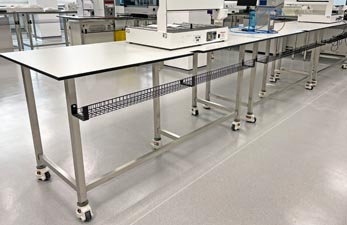
Stainless steel is a versatile material that can be used for worktops or as a framework. Its properties include high durability, chemical and heat resistance and ease of cleaning, making it ideal for labs where cleanliness is critical. Stainless steel worktops are widely used in laboratories where resilience against corrosive substances and high-temperature equipment is essential.
Selecting the right worktop material enhances both the functionality and lifespan of your laboratory space, balancing aesthetics with operational demands.
Selecting the Optimum Laboratory Cabinet Materials
Cabinets form the backbone of laboratory storage solutions and need to withstand daily wear and tear, offer a stable base and be easy to clean. As standard, Klick offer FSC certified Medium-Density Fibreboard (MDF) or Melamine-Faced Chipboard (MFC) for laboratory cabinet carcasses and doors.
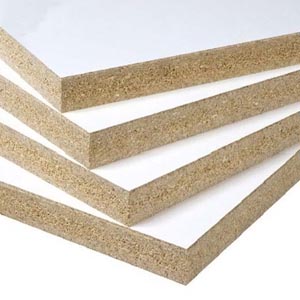
Medium-Density Fibreboard (MDF)
MDF has a dense structure and is known for its durability and ease of shaping.
While MDF is a sustainable material, there are some challenges associated with recycling it.
MDF is generally preferred if a laminate is required as the surface finish where a harder wearing material is required.
Melamine-Faced Chipboard (MFC)
MFC’s coarser particles allow for secure fixings and its dense outer layers improve impact resistance.
MFC is fully recyclable. Its melamine coating provides a non-toxic emission-resistant surface.
MFC’s strength and scratch resistance meet the technical standards of EN14323.
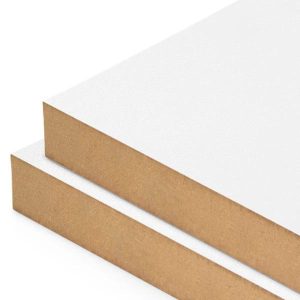
Trespa Cabinets
Some clients specify Trespa cabinets for high specification labs or particularly harsh environments that require intensive cleaning.
Final Thoughts: Prioritise Functionality, Safety and Longevity
Choosing the best materials for laboratory furniture is a critical step in creating a workspace that is safe, efficient, and durable. Facilities managers, scientists and procurement teams must consider chemical resistance, durability and maintenance needs when making their selections. Quality materials contribute to the longevity and resilience of lab furniture, ensuring your laboratory remains functional and compliant with safety standards over time. With expert advice and tailored solutions, you can create a lab environment that meets both current and future demands.
Testimonial
In addition to supplying and fitting a fixed formulation laboratory, Klick supplied 6 mobile lab workstations which give us 100% flexibility in our preparation area. These mobile units can support heavy equipment and make it easy to reposition things when we need to change the lab set up…. The quality of the furniture is excellent, and the labs work perfectly for our needs.”
Dr Sarah Maude – Vice President, Technology, Acadian Seaplants Limited
Our design team can offer advice on suitable materials for laboratory furniture. If you’re planning a lab project or want guidance on selecting materials please call 0161 998 9726 or contact us by email to arrange a consultation.
